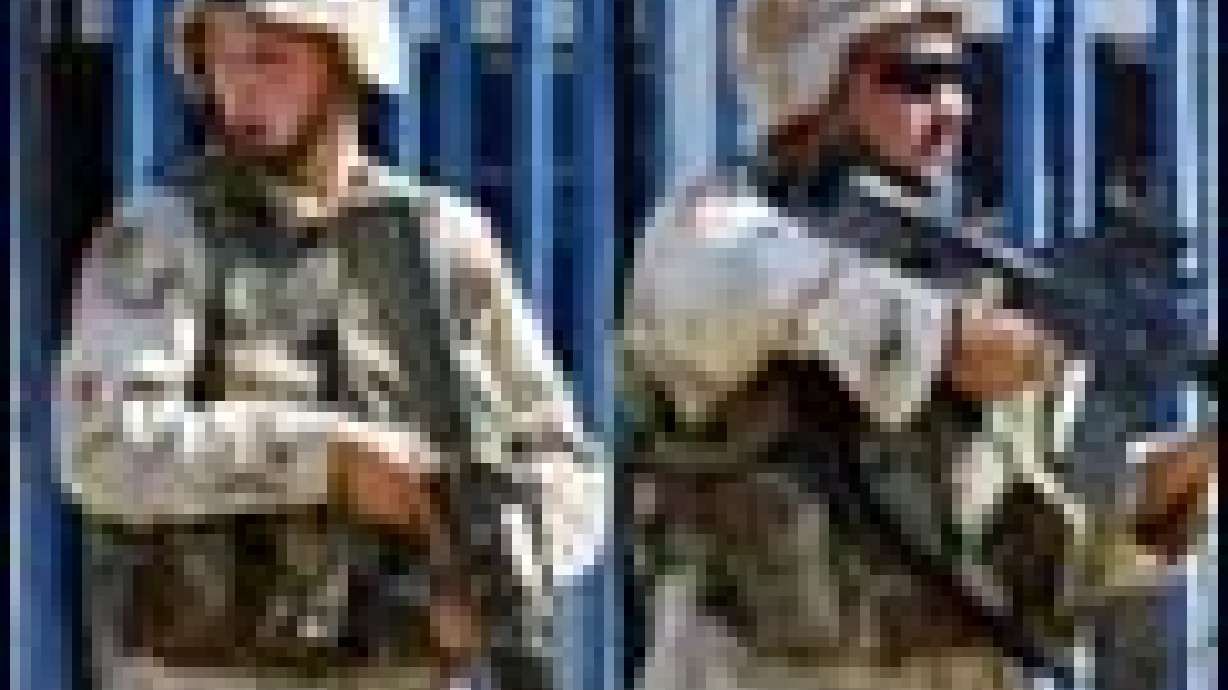Estimated read time: 4-5 minutes
This archived news story is available only for your personal, non-commercial use. Information in the story may be outdated or superseded by additional information. Reading or replaying the story in its archived form does not constitute a republication of the story.
BAGHDAD, Iraq (AP) -- Roadside bombs have claimed more American lives, killing three U.S. soldiers in separate attacks in Baghdad and Sunni Muslim areas to the north of the capital. At least six soldiers were injured in the attacks, one critically.
In the biggest attack, one soldier from Task Force Iron Horse was killed and four were wounded in a roadside bombing in Baqouba, 35 miles northeast of Baghdad. One of the wounded was critically injured and the other three were in guarded condition, the military said.
The first soldier from the Stryker Brigade to be killed by hostile fire died Monday evening in a roadside bombing in Tall Afar in northern Iraq.
Strykers are high-tech fighting vehicles and the brigade by that name was recently deployed from Fort Lewis, Wash.
Another soldier from the brigade was wounded in the blast. A soldier from the 1st Armored Division died and another was wounded in a bombing Monday in central Baghdad.
The latest deaths brought to 541 the number of Americans who have died since President Bush launched the Iraq war March 20. Most of the casualties have occurred since Bush declared an end to active combat May 1.
Witnesses said two roadside bombs exploded Tuesday outside the Anbar Medical College and hospital in Ramadi in the Sunni Triangle, damaging a U.S. Army Humvee. It was unclear if any soldiers or civilians were injured. A third bomb was defused.
As the casualties mount, the United States and its allies are preparing to hand over sovereignty to the Iraqis by July 1, despite disagreements over the best way to choose a new government.
Some members of the Governing Council said the U.S.-favored use of caucuses was losing support.
"This system is alien to us," said Naseer Kamel al-Chaderchi, a Sunni Muslim. "It's based on city councils and the integrity of these councils is in question."
He added that the Governing Council, which is sticking to the June 30 deadline for the transfer of power, hasn't had a formal discussion about caucuses, but said there is an "inclination" toward rejecting them.
Mahmoud Othman, a Kurdish Sunni member of the council, agreed that the caucus plan has little support. He said the Americans could simply hand over sovereignty to the Governing Council but most Iraqis wouldn't accept it because the body was appointed by the United States.
"So the second option is to hold a national conference with the wide participation of political and religious figures. A leadership will emerge from this conference to take over," he said. "Personally I prefer the second option because I think it will enjoy the greatest support among Iraqis. They Americans are saying now that they will not block any option agreed upon by the Iraqi people."
On Monday, U.S. administrator L. Paul Bremer said he would move to block any effort by Iraqi leaders to put Islamic law as the foundation of legislation in the interim constitution, which is supposed to take effect at the end of February.
However, Mohsen Abdel-Hamid, the current president of the Iraqi Governing Council and a Sunni Muslim hard-liner, has proposed making Islamic law the "principal basis" of legislation, which many Iraqi women's groups fear will threaten their legal rights.
Bremer must sign all measures passed by the 25-member council before they can become law, including the interim constitution. Iraq's powerful Shiite clergy, however, wants the interim constitution to be approved by an elected legislature. Under U.S. plans, a permanent constitution would not be drawn up and voted on by the Iraqi people until 2005.
Sadraldin al-Qubanji, the preacher at the Imam Ali shrine in Najaf and a key figure in the Supreme Council for the Islamic Revolution in Iraq, said Bremer should be wary of vetoing any constitution with sharia as its basis.
"No foreign views should be imposed on us," he said. "A political crisis will erupt if anyone tries to impose on Iraqis what they do not like."
Under most interpretations of Islamic law, women's rights to seek divorce are strictly limited and they only receive half the inheritance of men. Islamic law also allows for polygamy and often permits marriage of girls at a younger age than does secular law.
Police, meanwhile, arrested five Iraqis suspected in the assassination of Aquila al-Hashimi, a member of the Governing Council who was gunned down Sept. 20 as she left her Baghdad home, the Interior Ministry said.
The men were apprehended 10 days ago in the city of Amarah, 180 miles southeast of the capital, Deputy Interior Minister Ahmed Kadhum Ibrahim told The Associated Press. They were arrested for using drugs but police uncovered "indications" they may have been involved in the al-Hashimi slaying, he said. Police were still investigating.
Al-Hashimi was the highest official in the post-Saddam Hussein administration to be killed in the persistent violence in Iraq since Saddam's fall.
In Samawah, 230 miles south of the capital, Iraqi police said an explosion damaged a small video store that purportedly sold pornographic video discs. The pre-dawn explosion caused minor damage and no one was injured, Iraqi police Sgt. Hussan Tohayer said, adding it was the second such blast against a video store in the town since Jan. 22. A grenade exploded in a pool hall in the same town, but caused no injuries.
(Copyright 2004 by The Associated Press. All Rights Reserved.)








